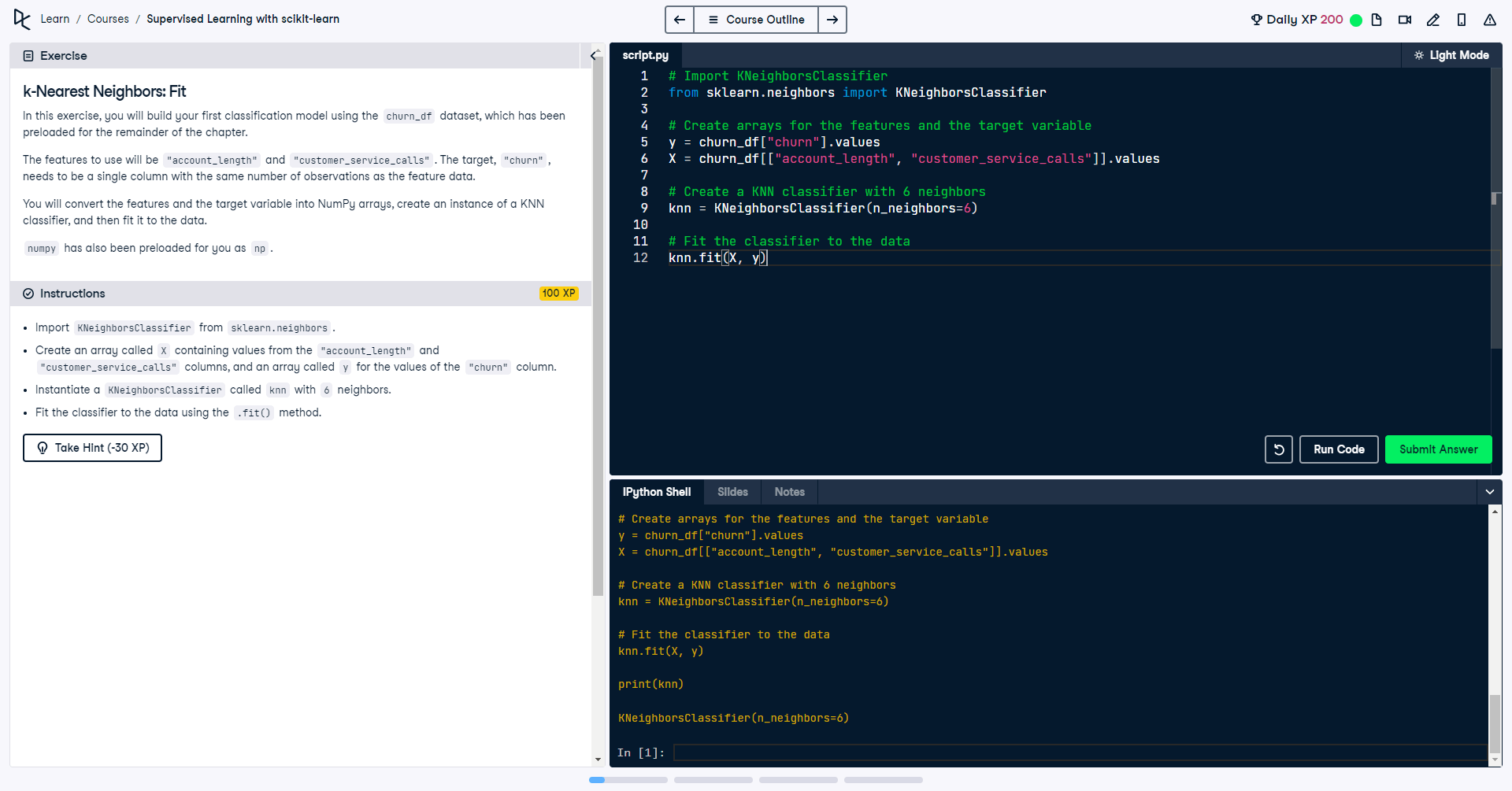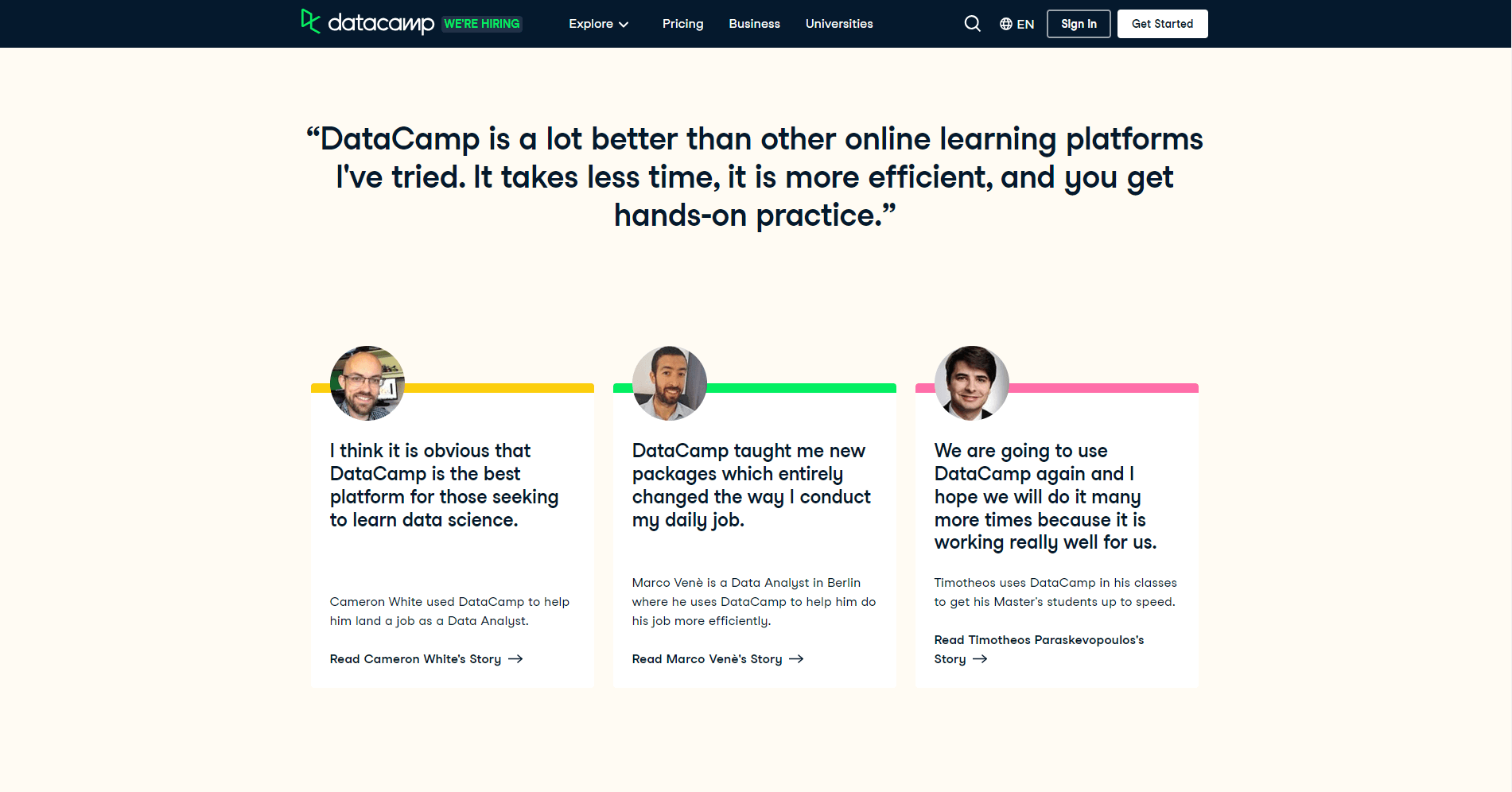Developing your data science and analytical coding skills - a review of DataCamp

Some of the links in this article are affiliate links. This means if you click on the link and purchase or subscribe, I will receive a commission. All opinions and recommendations remain objective. You can also read the affiliates disclosure for more information.
In this article, we will explore quite an in-depth overview of DataCamp, what it is, who it's for, how to get started and get the most out of it, alongside my experiences of using DataCamp to develop data science and career skills.
I hope this review can give you a solid starting point to decide whether DataCamp is right for you. Let's begin!
What is DataCamp?
DataCamp is an online learning platform and a powerful resource for learning how to code for data science.
Develop in-demand data science and AI skills at your own pace with 460+ courses. Learn SQL, Python, R, Tableau, PowerBI, ChatGPT and more with interactive exercises. Follow short videos led by expert instructors and then practice what you've learned with hands-on exercises in your browser.
Who is DataCamp good for?
- Beginners who want to learn how to code for data analysis, data science and / or data engineering
- Intermediate analysts who want to explore more complex data science topics
- Professional analysts who want to quickly refresh skills for a project or carry out continuous professional development
My experience with DataCamp
My first use of DataCamp way back in 2018 was through the Microsoft Professional Certificate in Data Science where it was used for the practical coding sections. I was both very impressed and hooked on data science, so subscribed for a yearly subscription to really commit to the change of career specialism.
I completed that alongside Harvard's Professional Certificate in Computer Science for Artificial Intelligence. Both of these courses were essential for me to break in to the field of data science and software development. Statistics accounted for 50% of my undergraduate degree but had no where near the hands on coding experience DataCamp provided.
Back then, I studied all of the introductary courses for Python, R and SQL. This gave me an excellent foundation for understanding how to use code to interrogate data and solve business problems.
Since then, I joined a large employer who provides a business subscription to DataCamp. This really helps me to balance a full-time job with learning. Ongoing professional development is vital, and this also helps when a project comes up I need a refresher on or a technique I’ve not used before or in a while.
We have recently started using Azure Databricks with PySpark for a prediction project, so the courses I am doing right now include:
Pricing and free tier
When it comes to pricing, it is very clear and easy to select your currency from the dropdown at the top right.
At the time of writing, there is a discount for a yearly subscription opposed to a monthly subscription which is great if you're ready to dedicate yourself to learning data science. Much like a gym membership, I think once you commit for the long term, you stick with it and make progress.
In terms of advancing your career, gaining access to an immense library of content and the ability to practice coding plus gain certification, I feel this price is very reasonable. When comparing the pricing to typical undergraduate tuition fees, I think the yearly pricing represents exceptional value for hands-on learning.
In the unlikely event that you try it and really don't gel with it then you can cancel easily.
Also, take advantage of the limited access free tier - you get every first chapter free.
Offers and promotions
From time to time there are promotions and discounts so be sure to take advantage of these if you decide DataCamp is right for you.
Here is a list I will keep updated with current and upcoming promotions and discounts:
- Student Discount - 50% Off for Students by subscribing to our Premium Student Plan!
- Black Friday Sale - 50% OFF November 13, 2023 11:59:00 (EST) to November 26, 2023 23:59:00 (EST)
- Cyber Monday Sale - 50% Off November 27, 2023 00:01:00 (EST) to December 7, 2023 23:59:00 (EST)
Getting started with DataCamp
After logging in to DataCamp, the Learn hub is the main place to access learning materials.
Although the video below is geared for business users, it's very helpful to everyone getting started with the basics of DataCamp including:
- Tracks - career or skill tracks currate courses into a guided track.
- Courses - interactive courses combining short videos with hands-on exercises.
- Practice - quick daily challenges to keep skills sharp.
- Assessments - test your skills to find your weak areas.
- Tutorials - lots of articles and how-to guides.
- Projects and Case Studies - solve real world problems guided or unguided.
Making the most of DataCamp
- Certifications - DataCamp Certification is an official recognition and a great way to prove your skills are job-ready.
- Workspace - personal in-browser tool to write code, and share your data analysis. Think of this as a cloud based Jupyter notebook-like tool.
- Competitions - apply skills to a real world task and compare to other DataCamp learners.
- Code Alongs - webinars and events.
- Popular topics - learn about new and trending tech like ChatGPT.
Does DataCamp have any weaknesses?
One of the downsides I've heard is that sometimes DataCamp can feel too much like a 'fill in the gaps' puzzle. I get this to an extent, but it's really important to not blindly go through the exercise, but to try and understand the exercise instead.
DataCamp is excellent at providing a taste of what an aspiring data scientist needs to start with. If aspiring analysts/data scientists become very interested in what they are exposed to, they'll then complement this with other learning methods and research wider (YouTube videos, textbooks, articles and so on).
For me, DataCamp is like a flight simulator; it teaches you what you need to know in a controlled environment, where you can make mistakes but don’t forget you also need to prepare for the real thing in a business setting which includes:
- Setting up an IDE such as RStudio, Spyder, Visual Studio Code, PyCharm on your own machine
- Installing Python (Base or Anaconda) or R on your own machine
- Using cloud tools like Azure, AWS, Google Cloud Platform, Databricks
- Setting up and configuring cloud databases with SSMS, Postgres etc
- Gathering requirements from real business stakeholders
- Selecting an explainable model for classification / regression given a business problem
- Managing a project from start to finish; delivering a working solution
- Presenting analysis to real stakeholders
Your first day as a Data Scientist probably won't include firing up DataCamp! However, gaining the skills required to land and carry out that role, it may well provide you.
You can check out the article Preparing for a statistical data science interview if you're preparing to apply.
What do others think about DataCamp?
To get a feel for what others think and their experiences, check out the stories page which has lots of learner outcomes.
I also read a really interesting article on How One Learner Saved 1,500+ Hours of Work By Taking 200+ Courses and Amassing 1,000,000+ XP.
Alternatives to DataCamp
It wouldn't be fair to finish the review without acknowledging alternatives to DataCamp. Although DataCamp is excellent for data science, if you have a slightly different goal in mind, another service may be better suited to you. These might include:
- Pluralsight - interactive and video courses on all areas of tech
- edX - courses from big-name universities and colleges with optional paid certificates
- Coursera - video courses on many topics including coding
- Udemy - video courses on many topics including coding
- freeCodeCamp - free interactive coding courses
I've used all of these in the past, my favourites were freeCodeCamp, edX and Pluralsight. My opinion is that freeCodeCamp is great for starting out, edX offers accreditation from universities and colleges like Harvard's CS50 AI, and Pluralsight is another enterprise favourite for tech with Microsoft usually offering a 3 month trial with their Visual Studio Enterprise / Professional subscriptions.
Final verdict
The overall conclusion to this review is that DataCamp is a fantastic resource for learning data science. It may not be perfect, nothing is, but it is one of the best tools out there to improve or maintain data science skills. It is no surprise that 80% of the Fortune 1000 use it.
A final thought is that every role seems to be demanding more skills in analysis, statistics and using data to make better decisions. This means that not just data scientists or data engineers need data skills, everyone does.
If you enjoyed this article be sure to check out other articles on the site. If you have any questions feel free to leave a comment 👍







